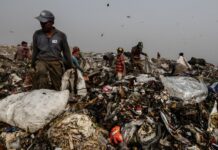
The $104-billion global toy industry has children at the heart, but Modi Toys – a company helping people stay connected to their Hindu heritage and Indian roots through modern toys and books – has gone a step further. Modi Toys has adopted eco-friendly practices in its manufacturing process to help ensure its soft toys help protect the environment for future generations. Each Modi Toys soft toy is made using an average of 6 to 15 recycled plastic bottles, depending on the size of the toy.
Avani Modi Sarkar, the Co-Founder, said, “Our mantra-singing soft toys and books have brought joy and cultural understanding to thousands of families worldwide. But we also recognize that toys are one of the leading plastic-intensive industries and use over 3.6M tons of plastic. So, we’re trying to do our part in spreading joy responsibly because we truly believe that even small businesses can have a surprisingly big impact on the environment.”
Celebrating Earth Day Every Day with Sustainable and Ethical Toy-Making Practices
There are three ways in which Modi Toys strives to make a difference in the environment. They use recycled plastic bottles to make the stuffing for their plush toys. A ticker on the Modi Toys’ website shows that the company has repurposed more than 68,000 plastic bottles into their plush toys as of the current date. In a concerted effort to reduce its carbon footprint, the company has also de-centralized its shipping network by creating hubs in the US and India. And lastly, Modi Toys has partnered with a local children’s charity to collect donated items like gently-used toys, books, and clothes for children. Modi Toys’ mission is to produce culturally enriching and significant products. As part of this objective, they encourage their customers to donate their old toys each time they purchase a new one.
Viral Modi, co-founder of Modi Toys, points out, “Earlier this year, we saw Prime Minister Narendra Modi wearing a jacket in the Parliament. It was a special one made from recycled PET bottles and was presented to him by the Indian Oil Corporation during the India Energy Week in Bengaluru. Such instances emphasize the significance of not only minimizing waste but also finding meaningful ways to upcycle it.”
Viral further added, “By prioritizing sustainable business practices and making our products 100% in India, we’re not only helping preserve our heritage, but also protecting our mother Earth while supporting local communities.”
Empowering Communities through Sustainable Toy-Making Practices
According to a 2021 study published in the Environmental International journal, the average Western household buys 40.3 pounds of plastic toys per child every year. The plastic pollution crisis will only continue to compound unless toymakers make a conscientious effort to incorporate sustainable practices. Demand from parents and eco-conscious consumers will help drive change within the industry to move towards sustainable practices.



























